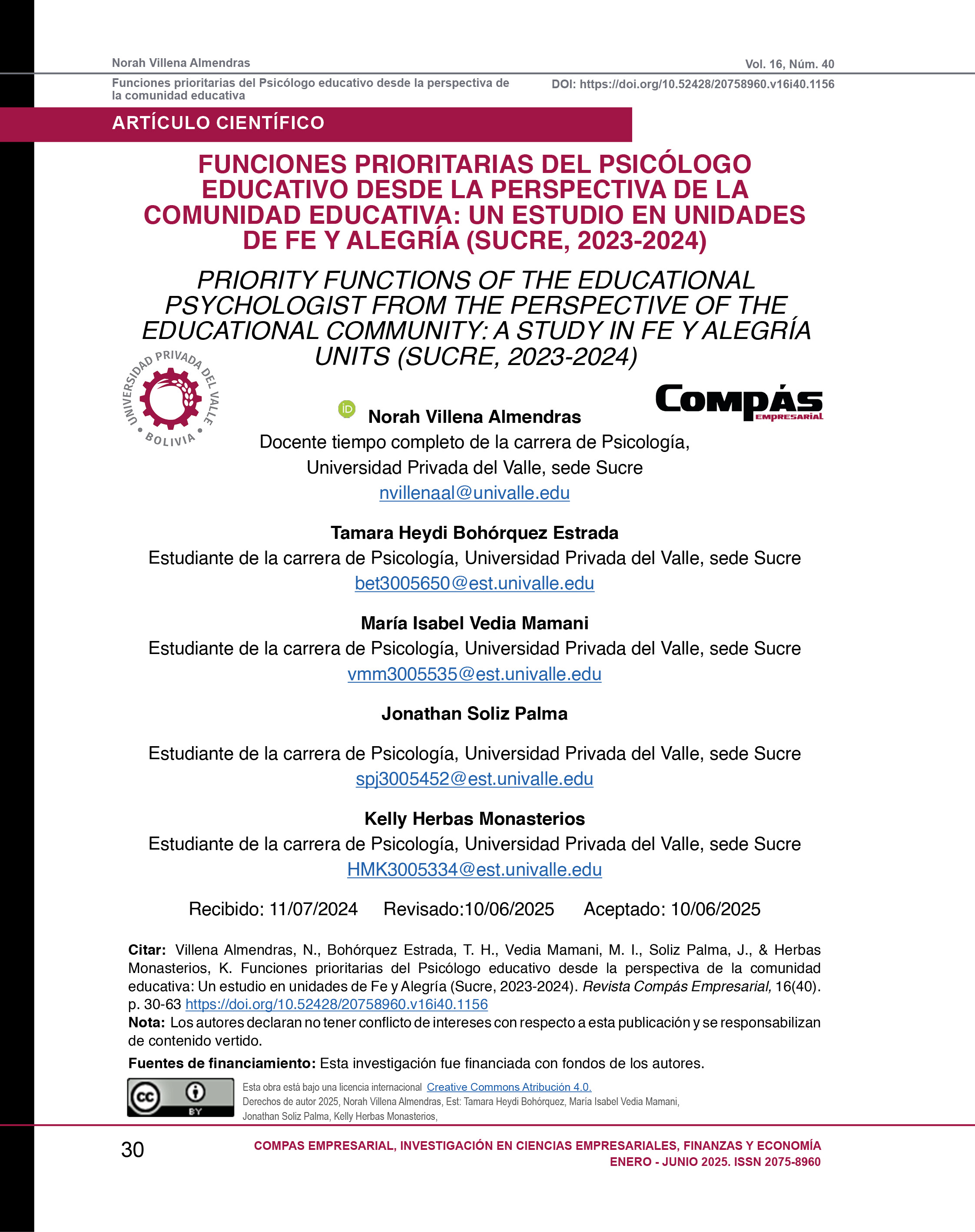Perceived needs of the functions of the educational Psychologist among teachers, principals, and parents of "Fe y Alegría" Educational Units in the city of Sucre (2023 - 2024)
DOI:
https://doi.org/10.52428/20758960.v16i40.1156Keywords:
Psychologist, perceived needsAbstract
In Bolivia, fiscal educational units and the majority of agreements lack items for Psychologists. Given this panorama, the general objective of the research is formulated: to establish the perceived needs towards the functions of the Educational Psychologist, in directors, teachers and parents of the Fe y Alegría educational Units of the city of Sucre. The research corresponds to the mixed approach, it followed deductive and inductive methods, it is descriptive, its design is non-experimental and transversal. A non-probabilistic sample of volunteer subjects was delimited, 4 directors, 44 teachers and 706 parents. The instruments were a Questionnaire, a Semi-structured Interview Question Guide and a Focus Group Question Guide. The majority of directors, teachers and parents of the initial levels in community family, primary vocational and secondary productive community of the educational units of Fe y Alegría of Sucre perceive it as very necessary for an educational psychologist to fulfill the functions of evaluating and intervening in specific student cases, intervene and advise students' families and advise and train teachers.
Downloads
References
Alarcón, Y., Ramírez, A. y Hernández, D. (2016). La función del psicólogo en el contexto escolar. Pontificia Universidad Javeriana. Psicología trabajo de grado. Recuperado de https://repository.javeriana.edu.co/bitstream/handle/10554/21371/AlarconCepedaYuriMarcela2016.pdf?sequence=1
Arvilla, A,, Palacio, L. y Arango, C. (2011). El psicólogo educativo y su quehacer en la institución educativa. Duazary, 8(2), 258-261. Recuperado de https://www.redalyc.org/pdf/5121/512156315017.pdf
Estrada, E., Hernández, C. y Medina, J. (2016). Estudio diagnóstico de las necesidades y demandas profesionales de la sociedad salvadoreña en el área de la Psicología Educativa realizado en la zona Metropolitana de San Salvador. Informe final de investigación de trabajo de grado para optar al título de licenciatura en psicología, Universidad de El Salvador. Recuperado de https://ri.ues.edu.sv/id/eprint/11873/1/14102986.pdf
García, C., Carrasco, G., Mendoza, M. y Pérez, C. (2012). Rol del psicólogo en establecimientos particulares pagados del Gran Concepción, Chile: Un proceso de co-construcción. Estudios Pedagógicos, 38(2), 169-185. Recuperado de https://www.redalyc.org/pdf/1735/173524998010.pdf
Gravini, M., Porto, A. y Escorcia, L. (2010). El psicólogo educativo en la actualidad: un facilitador del desarrollo humano integral. Psicogente, 13(23), 158-163. Recuperado de https://www.redalyc.org/pdf/4975/497552355012.pdf
Puig, M., Sabater, P. y Rodríguez, N. (2012). Necesidades humanas: evolución del concepto según la perspectiva social. Aposta, Revista de ciencias sociales, (54), 1-12. Recuperado de https://www.redalyc.org/articulo.oa?id=495950250005
Sánchez Cabezas, P., González Valarezo, M., & Zumba Vera, I. Y. (2016). El psicólogo educativo y su responsabilidad en la sociedad ecuatoriana actual: compromisos, retos y desafíos de la educación del siglo XXI. Universidad y Sociedad, 8(4), 123-129. Recuperado de http://rus.ucf.edu.cu/
Trujillo, B. (2018). Necesidades humanas prioritarias de los trabajadores próximos a jubilarse de la Unidad de negocios de Prosegur Cash, Sede Lima, Periodo 2018. Trabajo de Suficiencia Profesional. Universidad Inca Garcilaso de la Vega. Recuperado de http://repositorio.uigv.edu.pe/bitstream/handle/20.500.11818/3281/TRAB.SUF.PROF_Vanessa%20Trujillo%20Nano.pdf?sequence=2&isAllowed=y
Uribe Aramburo, N. (enero-junio, 2013). Fundamentos teóricos y funciones del psicólogo educativo. Revista Colombiana de Ciencias Sociales, 4(1), 135-149. Recuperado de UribeNicolas_2013_FundamentosTeoricosFunciones.pdf (udea.edu.co)

Published
Versions
- 2025-08-12 (2)
- 2025-06-30 (1)
How to Cite
Issue
Section
License
Copyright (c) 2025 Norah Villena Almendras; Tamara Heydi Bohórquez Estrada, María Isabel Vedia Mamani, Jonathan Soliz Palma, Kelly Herbas Monasterios

This work is licensed under a Creative Commons Attribution 4.0 International License.
Authors who publish with this journal agree to the following terms:
- Authors retain copyright and grant the journal right of first publication with the work simultaneously licensed under a Creative Commons Attribution License 4.0 that allows others to share the work with an acknowledgement of the work's authorship and initial publication in this journal.
- Authors are able to enter into separate, additional contractual arrangements for the non-exclusive distribution of the journal's published version of the work (e.g., post it to an institutional repository or publish it in a book), with an acknowledgement of its initial publication in this journal.
- Authors are permitted and encouraged to post their work online (e.g., in institutional repositories or on their website) prior to and during the submission process, as it can lead to productive exchanges, as well as earlier and greater citation of published work.









